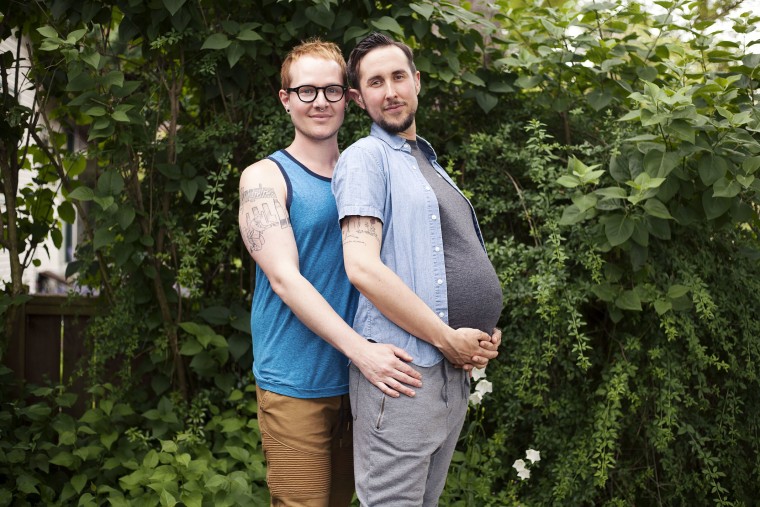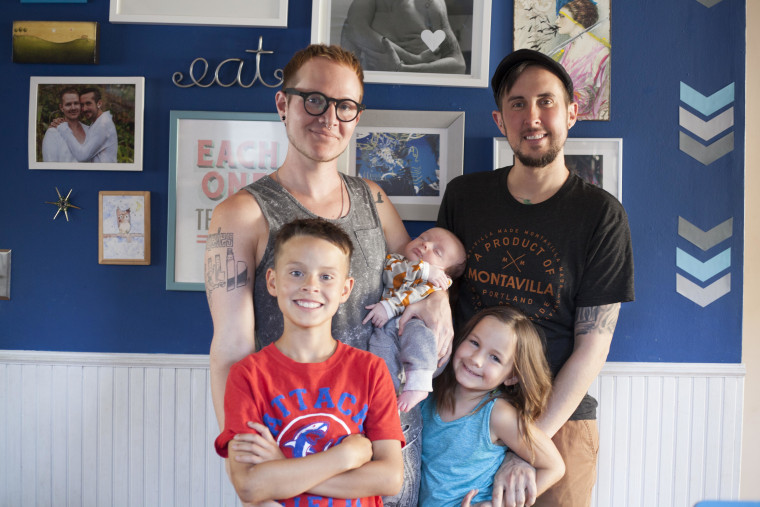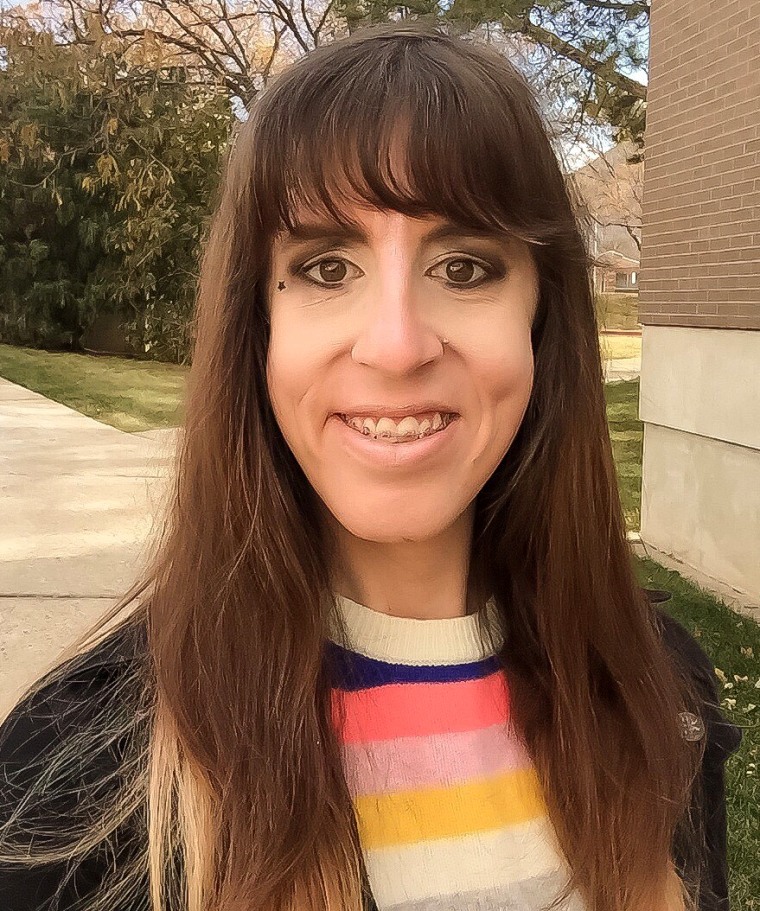‘Frightening’ Online Transphobia Has Real-life Consequences, Advocates Say
Trystan Reese, a transgender man and community advocate, thought social media would be a great place to share his pregnancy story with the world. Little did he know, he would face several years of “extreme backlash” for doing just that.
“I was pretty excited for the opportunity to start to add more positive stories to the sort of public narrative around what it can mean to be transgender today,” Reese, whose pregnancy story was covered by NBC News and countless other news outlets in 2017, explained.

Over the past two and a half years, however, Reese — who lives in Portland, Oregon, with his husband and three children — has dealt with online transphobia and misinformation circulating about his family. One example of this pervasive harassment involves a photo of Reese while pregnant along with a transgender woman friend. This happy image, shared on Instagram by his friend, was then used without permission in a number of fake stories and memes that appeared across the internet. Reese said the intentionally cruel posts mocked and misgendered them both and falsely claimed his friend was the biological parent of Reese’s child.
“People assume that’s true and run with it, and share with their friends,” Reese said of the transphobic posts, which, after being flagged by NBC News, were removed by Facebook for violating its policies. “People send us ugly transphobic memes that have been made of the best moments of my life.”
Social media: A double-edged sword for trans community
Social media platforms have been vital spaces for transgender people to gather and form a community, according to Gillian Branstetter, a trans advocate and the former spokeswoman for the National Center for Transgender Equality. However, she added, the hostility they frequently face on these platforms make trans individuals more apprehensive about using them.
“The internet was life-changing for transgender people,” Branstetter said. “It’s critical that platforms are providing a safe place for transgender people to find community.”
Reese shared a similar sentiment, saying social media is “both the best thing that ever happened to the transgender community, and it’s also the worst.”
“We’re able to provide immediate, real-time, lifesaving support to transgender people and their families, any time of the day or night, but we are also open to more scrutiny and direct one-on-one harassment and abuse than ever before,” Reese said.

According to a recent report from the anti-bullying organization Ditch the Label and its analytics partner, Brandwatch, 1.5 million (or 15 percent) of the 10 million transgender-related comments on social media platforms over a three and a half year period starting in 2016 were found to be transphobic.
“The scale of it is quite frightening, and it was quite shocking,” Toryn Glavin, a transgender advocate at the London-based LGBTQ nonprofit Stonewall, said of the report’s findings. “The conversations, how nasty they’ve turned, and how we’ve seen society really kind of polarized in the last few years, and we’ve seen trans communities be one of the scape goats that are thrown under that bus.”
Brennan Suen, the LGBTQ program director for Media Matters, a progressive nonprofit that monitors and analyzes misinformation across U.S. media outlets, singled out Facebook as “one of the biggest bad actors.” He said much of the anti-trans rhetoric found on social media has been spread by far-right publications whose content has gone viral on the platform.
Suen accused the social media titan of “blatantly” allowing The Daily Wire, a popular news outlet founded by conservative pundit Ben Shapiro, to break Facebook’s rules in order to make the site’s content go viral.
“If you look at an analysis of headlines with the word ‘transgender’ in them, the most engaged-with website on that issue was The Daily Wire,” Suen said. “It’s a very successful tactic for them.”
“They know that they can build outrage, they know that they can scare people, and they know that people don’t understand the issue very well,” Suen added. “So they can spread misinformation about [transgender issues], and also get a lot of clicks.”
Related
Trans dads tell doctors: ‘You can be a man and have a baby’
A recent report from Popular Information — a newsletter created by journalist, lawyer and ThinkProgress founder Judd Legum — found that 14 Facebook pages with a combined 7.5 million followers are exclusively posting articles from The Daily Wire, which regularly publishes anti-LGBTQ stories. The administrators for those pages claim to be unaffiliated Facebook users but appear to be centrally controlled by The Daily Wire, which would be a violation of Facebook’s community standards against inauthentic behavior. The pages frequently share the same articles simultaneously and help the conservative outlet’s content go viral. In September, The Daily Wire received 15,283 engagements per story on Facebook compared to 1,871 for The New York Time, 2,119 for The Washington Post and 6,824 for The Huffington Post, according to the Popular Information report.
In a statement to NBC News, Jon Lewis, the vice president of The Daily Wire, claimed the company has “always worked to comply with Facebook policy.”
“We do not believe that the audience for any page that we operate has been deceived as to Daily Wire’s relationship with these pages, nor did we intend any such deception; indeed, it would be exceedingly difficult to miss that all the posts were from Daily Wire,” Lewis stated.
“In an average month, less than 5% of our total Facebook traffic comes from pages other than Daily Wire or our talent pages — primarily Ben Shapiro,” he added, though NBC News was unable to verify his claims. “Facebook has announced a new transparency initiative, and like other publishers, we have been working to implement it on schedule.”
A Facebook spokesperson told NBC News the company announced the new transparency policy earlier this month that it is applying to the 14 pages exclusively promoting The Daily Wire’s content, but the spokesperson did not confirm how the policy would be applied or whether the pages would removed.
“Since the launch of our new page transparency policy, we are actively reaching out to and reviewing various/numerous networks,” the spokesperson stated.
Related
A viral fake news story linked trans health care to ‘thousands’ of deaths
The Daily Wire, however, is far from the only conservative outlet publishing transgender-related articles to Facebook that are false, misleading, blatantly transphobic or some combination of the three — and many of these stories have gone viral in recent months. Suen estimates that a large portion of the “millions” of engagements received by anti-trans articles — many of which he said paint trans issues as hostile to women and children — come from Facebook.
In September, a story first covered by the Catholic news outlet Lifesite News falsely claimed that hormone blockers used by doctors to delay puberty in transgender teenagers are linked to cancer. The story went viral on Facebook and Twitter and was covered by other conservative outlets, including the Christian Post and The Daily Wire. NBC News later published an article poking holes in these claims.
Then in late October, The Daily Signal, a “multinews arm” of the Heritage Foundation, a conservative think tank with a history of fighting against LGBTQ rights, and the Christian Post both circulated a story about a mother claiming to have lost her college-age children to what she described as “the trans cult” after they transitioned.
Earlier this month, a custody dispute between a Texas couple who disagreed about the gender identity of their 7-year-old child received widespread media attention, which eventually spilled over into state politics. Many right-wing media outlets falsely claimed the child’s mother, Anne Georgulas, a pediatrician, was forcing the child to live as a girl and to medically transition. Following the misleading coverage, a rock was thrown through Georgulas’ window while her children were asleep, and she was forced to close her business after dead animals were left on its doorstep, according to her representative, Karen Hirsch.
Related
‘Pro-lesbian’ or ‘trans-exclusionary’? Old animosities boil into public view
Transphobia goes beyond the far-right mediasphere. Katelyn Burns, a Washington, D.C.-based freelance journalist who is transgender, said she regularly deals with harassment on social media, most of it from “trans-exclusionary radical feminists,” commonly referred to as “TERFs” or “gender critical feminists.”
Burns said an image of her and her two young children was mysteriously uploaded to a “gender critical” Reddit in 2017 that she described as a “hive” of virulent anti-transgender feminists. She said members of the group mocked her and her children’s appearances. She said moderators eventually removed the image after she contacted them.
Burns said online harassment is frustrating because anonymous abusers work together to bully trans people across social media platforms.
“Once the harassment starts, it’s really hard to stop it,” she said. “You just have to ride it out until it ends on its own.”
On Twitter and Reddit, also in 2017, a number of accounts circulated another photo of Burns alongside the term “autogynesmile,” a label adopted from “autogynephilia,” a widely criticized and controversial theory invented by sexologist Ray Blanchard that claims trans female identity is linked to a sexual fetish. According to Burns, so-called gender-critical feminists concocted the term “autogynosmile” to mock the way trans women look in selfies. At one point, Burns said, if you searched “autogynesmile” on Google, her picture would be among the first images to pop up.
A number of trans-exclusionary organizations purporting to be progressive feminist groups, including the Women’s Liberation Front, are joining forces with conservative groups to oppose trans rights and spread the narrative that trans activism is hostile to women’s rights. The Hands Across the Aisle Coalition, for example, is an alliance of self-proclaimed “radical feminists, lesbians, Christians and conservatives” who claim to be “tabling our ideological differences” in order to “oppose gender identity ideology.”
Related
Trump campaign adviser says gays an ‘abomination,’ men prefer ‘handmaidens’
Heron Greenesmith, a senior research analyst at Political Research Associates, an organization that tracks anti-transgender rhetoric in mainstream media, said far-right organizations are leveraging gender-critical feminists, whose views Heron said do not reflect the wider feminist community, to give credence to anti-LGBTQ policies and agendas.
“Here in the U.S., mainstream Christian right and Evangelical right organizations have been platforming anti-trans feminists to give anti-trans advocacy the veneer of a much broader base of support than it actually has,” Greenesmith said. “This is a tactic that the right uses all the time: Find a minority member of a marginalized group who are willing to throw other marginalized folks under the bus, in the name of scarcity mindset.”
Whether it’s from the political right, left or center, online transphobia and the spread of false and misleading narratives can have dangerous, real-life consequences, transgender advocates say.
“There’s been a significant amount of research showing a close relationship between online violence and physical violence, and given the steep relationship of mistrust between transgender people and law enforcement, understanding the scope of the threat that people feel is critical,” Branstetter said.

This relationship between online harassment and physical violence is real-life fear for Jari Jones, a black trans activist who recently starred along with her girlfriend, who is also trans, in the YouTube series “My Trans Life.”
“Media is very powerful, and if we allow that, allow hate, and allow violent behavior with words, people think it’s OK, and that creates an atmosphere of violence for trans people,” said Jones, whose YouTube show received many abusive comments that attacked her gender identity.
“People are more willing to attack a trans person, because they see it on TV, they’re more willing to attack a trans person or say whatever they want to a trans person or a queer person, because they see this online, nobody’s checking them for it,” she added.
According to the 2015 U.S. Transgender Survey, almost half of the survey’s 27,715 respondents reported being denied equal treatment, verbally harassed and/or physically attacked in the past year for being trans. And the FBI’s latest hate crimes report, which was released earlier this month, found a 34 percent increase in reported hate crimes against trans people from 2017 to 2018.
LGBTQ advocates, including Branstetter and Suen, say the persistent — and often unfairly depicted — focus on more polarizing issues, like trans women in competitive sports, deflect public attention away from the high-levels of discrimination and violence the trans community experience.
“There’s so many issues like access to housing, access to economic opportunities, being able to live without the threat of violence, that are never talked about or seen by a wide majority or a wide swath of the country,” Suen said.

The Chris Mosier✔@TheChrisMosier
Transphobia in the form of “comedy” is still transphobia.
Also: Trans women are harassed, fired from their jobs, denied housing/health care/shelter spaces & MURDERED at a rate exponentially higher than their peers, but please, tell me one more time to take a joke….#TransWeek https://twitter.com/southpark/status/1194815619251630080 …South Park✔@SouthPark#SouthPark23 #strongwoman1,5815:39 PM – Nov 15, 2019Twitter Ads info and privacy491 people are talking about this
‘Those people got in my head’
Social media platforms say they have taken steps to limit hate speech and harassment, but many civil rights and anti-bullying advocates say they haven’t gone far enough.
In a statement to NBC News, a Facebook spokesperson said the company doesn’t allow “attacks based on gender identity, including violent or dehumanizing speech, statements of inferiority, and calls for exclusion or segregation.” The spokesperson stated the platform removed “7 million pieces of content for violating our hate speech policy, of which we proactively detected 80 percent before people reported it to us” in Q3 2019.
In a June statement, YouTube stated that the company removes content if it determines “the primary purpose of the video is hate or harassment.”
YouTube allowed Steven Crowder, notorious for his anti-LGBTQ rhetoric, to keep his channel, which has over 4 million subscribers, but said it stopped the conservative pundit from running ads after seeing “the widespread harm to the YouTube community resulting from the ongoing pattern of egregious behavior.”
And earlier this month,YouTube removed a video from The Daily Signal in which Dr. Michelle Cretella, a pediatrician, stated, “See, if you want to cut off a leg or an arm, you’re mentally ill, but if you want to cut off healthy breasts or a penis, you’re transgender.” YouTube said it removed the video because Cretella’s statement violated its hate speech policy, according to news reports.
Cretella is the executive director of the American College of Pediatricians, an organization that the Southern Poverty Law Center calls “a fringe anti-LGBT hate group that masquerades as the premier U.S. association of pediatricians to push anti-LGBT junk science.”
Related
Transgender Day of Remembrance: At least 22 trans people killed in 2019
Katrina Trinko, editor-in-chief of The Daily Signal, accused YouTube of censorship in commentary published Nov. 5.
“We are especially disappointed with YouTube’s decision because other social media platforms have allowed the video on their platforms,” Trinko wrote. “In fact, the video has more than 70 million views on Facebook. It might have even more if Facebook hadn’t temporarily removed it in July 2018. After our appeal to Facebook, it was quickly restored and remains on The Daily Signal’s page today.”
Last year, Twitter made “misgendering” and “deadnaming” users — referring to a trans person as their sex assigned at birth or by their given name, if different from their chosen name — against its hateful conduct policy. A number of users, including Meghan Murphy, founder of the Canadian radical feminist website The Feminist Current, were banned from Twitter for violating these rules. Murphy disputes she violated Twitter’s rules and unsuccessfully sued the company over the ban.
Burns said she has shielded herself from abuse on Twitter by subscribing to blocklists and by limiting her notifications to only accounts that follow her, but she said abuse has been more difficult to avoid on Facebook. After Burns wrote a viral story for Vox about “gender-critical feminists,” she said a Facebook user angered by the story tagged her in an abusive post on the platform, which then generated “hundreds” of abusive replies from other users. Burns said she reported the online harassment to Facebook, but the company said it would not remove the initial post because, as a journalist, Burns is considered a public figure.
“I couldn’t write again for like two weeks afterwards, because those people got in my head,” Burns said. “They say things, and you start believing it after enough people have said it.”
Reese said reporting abuse to Facebook feels “completely useless.”
“I flag them as hateful, I flag them as untrue, I flag them as bigotry,” he said, adding that the process is like “trying to use my thumb to stop a damn.”
Related
Ellen surprises lesbian couple whose family won’t attend wedding
Both Burns and Reese said they use social media to do their jobs, which makes abandoning these platforms impossible.
While preventing online abuse altogether may be impossible, Glavin said social media companies should join forces with trans people to help minimize the online abuse they experience.
“I think really the way forward for social media companies is to work with trans communities and to kind of sit down with trans communities and figure out what is happening, what is the current situation, what are the kind of things that they should watch out for, what are the signs and symptoms that that kind of transphobic bullying is happening, and then trying to build policies around that,” Glavin said.
Reese lamented that there does not seem to be a “coordinated interest” from social media companies in protecting the voices of trans people who are “desperately trying to tell our stories.”
“We’re desperately trying to answer all of our direct messages from trans youth who think they have no hope,” Reese said. “We’re trying so hard to do this positive, life-affirming work, and we’re doing it against brutal odds.”



